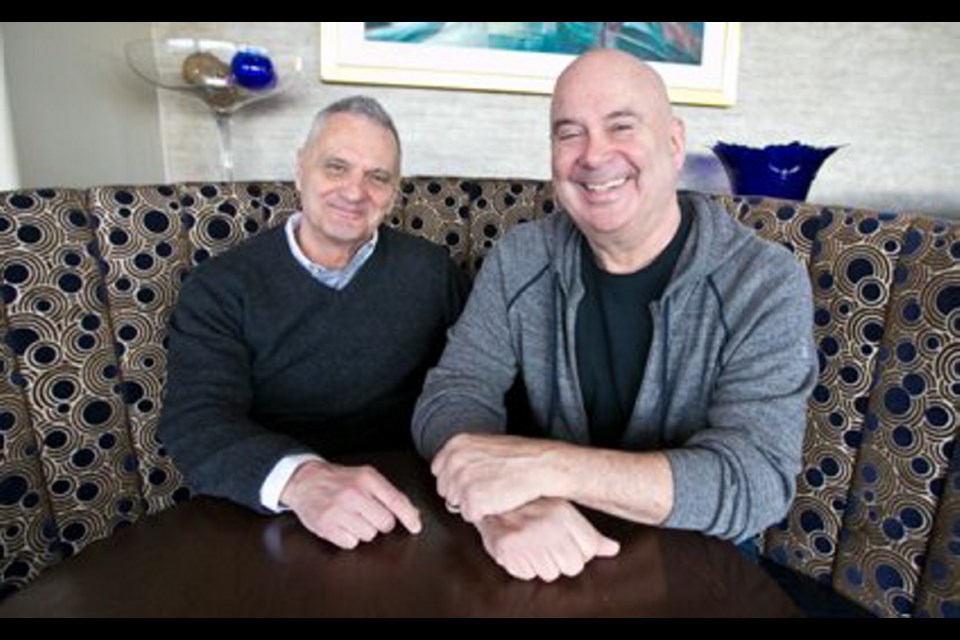What: The Barber of Seville
Where: Royal Theatre
When: Feb. 11, 13, 17, 19, 21
Tickets: Starting at $25
Some say if you’re married and also work together, it’s wise to avoid talking shop at home.
Morris Panych and Ken MacDonald don’t see it that way. They’ve been together for 35 years, married for 11. They’ve collaborated in theatre for decades, partnering on about
100 productions.
“Oh, we talk about work all the time,” said MacDonald, who designed the set for Pacific Opera Victoria’s new production of The Barber of Seville.
Panych, a well-known Canadian playwright and director, is directing the opera. He was the more outspoken of the two.
“We sometimes fight,” Panych said in a recent interview.
At home in Toronto, their working arrangement is as follows: Panych, 63, has an upstairs office. He wears ear-buds to shut out outside noise, listening to Shostakovich and Prokofiev.
Meanwhile, the more imperturbable MacDonald is able to multi-task in his studio below with the radio and TV on simultaneously. The 66-year-old likes to nip upstairs to bounce ideas off Panych, who’s typically deep in thought.
“He kind of throws this s--- at me. And when you’re writing, it takes a long time to get inside your head,” Panych said.
They have contrasting personalities [“Ken is a Taurus,” said Panych. “He digs in his heels.”} But they share two important things: a similar sense of humour and like-minded ideas on what makes for compelling theatre.
At a downtown restaurant, they scanned the menu. Then they bantered in that easygoing, faintly exasperated way common to long-time couples.
“There’s no breakfasts,” Panych complained.
MacDonald: “Well, then you’ll have to order lunch.”
Panych: “You know what they have? Crispy squid wrap. What’s that all about?”
He has directed a handful of operas, including a Macbeth for POV in 2012. But the bulk of Panych’s career has been in theatre. A two-time Governor General’s Award winner, he has penned 20 plays. These tend to be irreverent, sharply comic, with absurdist touches. The Belfry Theatre has staged some, including The Trespassers, The Ends of the Earth, Earshot and Vigil.
Although they enjoy the art form, Panych and MacDonald say they’re not particularly opera aficionados. When Panych participated in a Victoria talk about The Barber of Seville, he declared: “I don’t actually know anything about opera.” However, that might be the provocateur side of Panych (familiar to arts journalists) coming out.
He contends the biggest crime a director can commit — whether it be theatre or opera — is the creation of dull art. It’s a pitfall he aims to avoid with The Barber of Seville.
“Theatre. Good grief. There’s so much boring theatre. You’re stuck in a space and you can’t get out of that space,” Panych said.
Ditto for film. “I go to lots of movies where I think, this is so f---ing boring.”
His vision for The Barber of Seville is simply, well … to keep it simple. Yes, the enduring popularity of Rossini’s opera buffa makes it familiar territory — perhaps overly so — for the typical opera-phile. And yes some directors, perhaps bored, impose wild interpretations on such chestnuts.
Panych has embraced a “grounded” approach that’s respectful of Rossini’s intent. He has encouraged the singers to bring out the storyline, to make the audience care about the characters and situations.
Still, The Barber of Seville is a romp. Doddering fools are hoodwinked; secret love-notes buzz about. Panych does want the opera to be funny. And brisk.
“From my point of view, comedy is about velocity. With the actors I call it ‘critical lift.’ If you don’t do it at a certain speed, the thing won’t take off.”
MacDonald, the winner of many Gemini, Jessie Richardson and Betty Mitchell awards, has concocted a gorgeous set. He showed photos of it on his phone.
The design is influenced by Spanish architect Antoni Gaudí, who favoured buildings with organic forms during his “naturalist” period. MacDonald’s set offers curving, monumental-looking edifices — mostly white — that look both modern and timeless. Art-nouveau filigree and bold splashes of colour add interest.
When it comes to design, MacDonald, like his partner, expressed disdain for the commonplace. “You know, like if you see a couple of chairs and a brown curtain,” he said.
“You can do a lot with a couple of chairs and a brown curtain,” Panych said. “You just have to have an imagination.”
They agree theatre must be deliberately theatrical. It cannot compete with cinema, aspiring to faithfully recreate reality. That approach, said Panych and MacDonald, is pointless.
“It should go way beyond naturalism into an interpretive space, so the audience always feels like it’s looking at a piece of theatre,” Panych said.
The pair met in Victoria about 1977. Panych was acting in a show called Spokesong, which MacDonald had designed. They hit it off. Several years later, they became romantically involved.
“That was at the Belfry Theatre,” MacDonald said with an affectionate grin. “It was the first I ever saw him.”
[email protected]



